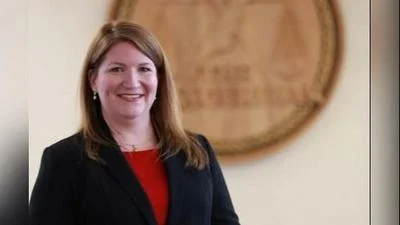Business | Pexels by fauxels
Business | Pexels by fauxels
The Missouri Senate gave final approval today to a bill that would encourage small and start-up businesses in Missouri. Associated Industries of Missouri supports the bill.
SS SCS SB 3 & 69, sponsored by Sen. Denny Hoskins (R-21), contains several provisions to aid small businesses and start-ups and to encourage entrepreneurship.
"The goal of the regulatory sandbox bill is to bring new and innovative services and products to our state," said Sen. Hoskins. "We have already seen success with similar programs in other states such as Utah and Arizona. Our hope is to encourage new and existing businesses of all sizes to show us what they have to offer without fear of burdensome or unnecessary regulations that could slow their progress."
The bill creates the Office of Entrepreneurship within the Department of Economic Development. The Office shall employ an individual to promote policies and initiatives to support the growth of entrepreneurship of Missouri-based businesses with less than ten employees, including entrepreneurship within racial minority groups, and women and veteran entrepreneurship, in Missouri.
The bill requires the Commissioner of Administration to file a report with the General Assembly that includes information on contracts awarded to businesses that have been in operation for less than three years, as described in the act by June 30, 2025, and annually thereafter.
This act also requires the Commissioner of Administration, in conjunction with the Office of Entrepreneurship, to file a report with the General Assembly making recommendations on improving access and resources for new Missouri businesses that have been in operation for less than three years, including businesses owned by a racial minority group, and women-owned and veteran-owned businesses.
This bill establishes the "Regulatory Sandbox Act", which creates the Regulatory Relief Office within the Department of Economic Development (DED). The Regulatory Relief Office would identify state laws or regulations that could potentially be waived or suspended for participating businesses during a two-year period in which the participating business demonstrates an innovative product offering to consumers.
The Regulatory Relief Office would also maintain a web page on the DED website that would invite residents and businesses to make suggestions regarding laws and regulations that could be modified or eliminated to reduce the regulatory burden of residents and businesses in Missouri.
The Regulatory Relief Office would be responsible for evaluating and approving or denying applications to participate in the Sandbox Program. An applicant would submit an application along with a $300 application fee to the Regulatory Relief Office, which must include contact information and a description of the innovative offering to be demonstrated, including statements regarding how the innovative offering is subject to licensing, legal prohibition, or other authorization requirements outside of the Sandbox Program; each law or regulation that the applicant seeks to have waived or suspended while participating in the Sandbox Program; how the innovative offering would benefit consumers; and what risks might exist for consumers who use or purchase the innovative offering.
No later than fifteen business days after the day on which a completed application is received by the Regulatory Relief Office, the Office shall review the application and refer the application to each applicable agency, as defined in the act, that regulates the applicant's business. No later than sixty days after the day on which an applicable agency receives a completed application for review, the applicable agency shall provide a written report to the Sandbox Program director with the applicable agency's findings, including any identifiable, likely, and significant harm to the health, safety, or financial well-being of consumers that the relevant law or regulation protects against, and a recommendation to the Regulatory Relief Office that the applicant either be admitted or denied entrance into the Sandbox Program. An applicable agency may deny an application for reasons described in the act. The Regulatory Relief Office shall not approve any application denied by an applicable agency.
Upon the receipt of a report from all applicable agencies, the Regulatory Relief Office shall provide the application and associated reports to the General Regulatory Sandbox Program Advisory Committee, which is created by the act. The Advisory Committee shall be composed of eleven members, as described in the act. The Advisory Committee shall advise and make recommendations to the Regulatory Relief Office on whether to approve applications to the Sandbox Program, and may meet at its own discretion to override a decision of the Regulatory Relief Office on the admission or denial of an applicant to the Sandbox Program, provided such override is decided with a two-thirds majority vote of the members of the Advisory Committee, and further provided that such vote shall be taken within fifteen business days of the Regulatory Relief Office's decision. Meetings of the Advisory Committee shall be considered public meetings for the purposes of the Sunshine Law.
Upon approval of an application, a sandbox participant would have two years following application approval to demonstrate the innovative offering described in the sandbox participant's application. During such period, the sandbox participant would be exempt from the laws and regulations outlined in an agreement entered into with the Regulatory Relief Office. Innovative offerings shall only be available to consumers who are residents of this state, and no law or regulation shall be waived or suspended if such waiver or suspension would prevent a consumer from seeking restitution in the event that the consumer is harmed. A sandbox participant shall not be subject to prosecution or administrative penalty for a violation of any law or regulation that is waived or suspended during the duration of the participant's demonstration period.
At least forty-five days prior to the end of a participant's demonstration period, the participant shall notify the Regulatory Relief Office that it either intends to exit the Sandbox Program or that it seeks an extension. The Regulatory Relief Office may grant an extension not to exceed twelve months, and a participant may seek multiple extensions. If a demonstration includes an innovative offering that requires ongoing services or duties beyond the two-year demonstration period, the participant may continue to demonstrate the offering, but shall be subject to all laws and regulations that were waived or suspended as part of the Sandbox Program, provided that any participant that receives an extension to the demonstration period shall not be subject to the waived or suspended laws and regulations until after the end of the extended demonstration period.
A sandbox participant shall retain certain records for a period of two years after exiting the Sandbox Program. The Regulatory Relief Office shall establish quarterly reporting requirements for each participant, and each participant shall notify the Regulatory Relief Office and each applicable agency of any incidents that result in harm to the health, safety, or financial well-being of a consumer.
No later than forty-five days after a sandbox participant exits the Sandbox Program, such participant shall submit a written report describing an overview of the demonstration. No later than thirty days after receiving such report, an applicable agency shall provide a written report to the Regulatory Relief Office that describes any statutory or regulatory reform the applicable agency recommends.
The Small Business Regulatory Fairness Board in current law would be abolished by the bill. During testimony, it was pointed out the Board has not functioned in many years.
The bill now moves to the House for further consideration.
Original source can be found here.



 Alerts Sign-up
Alerts Sign-up